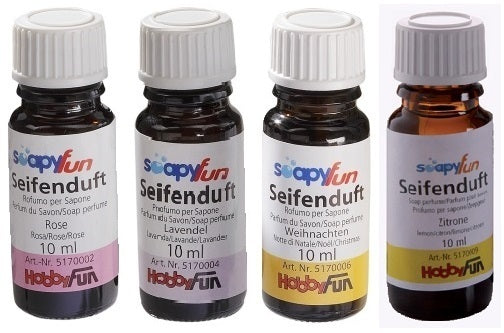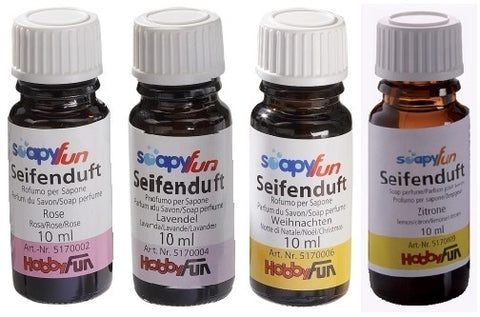Soap is one of the basic needs of everyday life. It is important that we choose a soap that suits our needs and preferences. One way to do this is to use scented oils in soaps. But which fragrance oils are best suited?
Choosing the right scented oils for soap depends on various factors such as the scent you want, the quality of the oil and the purpose of the soap. In this article, we will take a closer look at the different fragrance oils for soap and help you make the right choice to create a soap that not only smells good but also has the desired effect.
There are many scented oils that are suitable for soap making. Some of the most popular choices are lavender, lemongrass, eucalyptus, mint, and rosemary. These essential oils not only have a pleasant scent, but also bring many benefits to the skin. It's important to use quality fragrance oils to ensure they are safe for the skin and able to work to their full potential.

Which scented oils for soap?
If you want to make a homemade soap, scented oils are an important ingredient. Not only do they add a pleasant smell to the soap, but they can also provide additional health benefits. But which fragrance oils should you use in your soap? Here is some important information about it.
1. Lavender Oil
Lavender oil is a popular fragrance oil for soap. It has a calming scent and can help relieve stress. Lavender oil can also help soothe skin irritation, making it ideal for sensitive skin types. If you decide to use lavender oil in your soap, you should make sure it is of high quality for best results.
Benefits Of Lavender Oil For Skin:
- Soothing effect on the skin
- Soothes skin irritations
- Helps fight acne
- Has a moisturizing effect
Lavender Oil vs. Other Fragrance Oils:
| lavender oil | lemon oil | peppermint oil |
|---|---|---|
| reassuring | Refreshing | Stimulating |
| Relaxing | Cleaning | Cooling |
| Helps fight acne | Has an antibacterial effect | May help relieve nausea |
2. Lemon Oil
Lemon oil has a refreshing scent and can help uplift your mood. It is well suited for use in soap as it also has a cleansing effect on the skin. However, lemon oil can be a bit drying, so it's important to combine it with other oils to avoid over-stressing the skin.
Benefits Of Lemon Oil For Skin:
- Cleansing effect on the skin
- May help reduce dark spots
- Looks refreshing
- Helps fight acne
Lemon Oil vs. Other Fragrance Oils:
| lemon oil | lavender oil | Tea-Tree-Night |
|---|---|---|
| Refreshing | reassuring | Antibacterial |
| Cleaning | Has a skin-soothing effect | Helps fight acne |
| May help reduce dark spots | Has a moisturizing effect | Has an anti-inflammatory effect |
3. Teebaumöl
Tea tree oil has powerful antibacterial properties and can help fight acne and other skin problems. However, it also has a strong odor that can be uncomfortable for some people. If you choose to use tea tree oil in your soap, you should use it in moderation and combine it with other fragrance oils to balance the smell.
Benefits of Tea Tree Oil for Skin:
- antibacterial effect
- Helps fight acne
- Has an anti-inflammatory effect
- Regulates sebum production
Tea Tree Oil vs. Other Fragrance Oils:
| Teebaumöl | lavender oil | peppermint oil |
|---|---|---|
| Antibacterial | reassuring | Stimulating |
| Helps fight acne | Has a skin-soothing effect | Cooling |
| Has an anti-inflammatory effect | Has a moisturizing effect | May help relieve nausea |
4. Rosemary Oil
Rosemary oil has a refreshing scent and can help improve blood circulation in the skin. It also has antioxidant effects and may help protect skin from free radical damage. However, rosemary oil can be a bit drying, so it's important to combine it with other oils to avoid over-stressing the skin.
Benefits of Rosemary Oil for Skin:
- Improves blood circulation in the skin
- Antioxidant effect
- Looks refreshing
- Can help tighten skin
Rosemary Oil vs. Other Fragrance Oils:
| rosemary oil | lemon oil | lavender oil |
|---|---|---|
| Refreshing | Refreshing | reassuring |
| Improves blood circulation in the skin | Cleansing effect on the skin | Soothes skin irritations |
| Antioxidant effect | May help reduce dark spots | Helps fight acne |
5. Patchouli oil
Patchouli oil has a warm, earthy scent and can help soothe the skin. It also has antimicrobial effects and can help fight skin infections. Patchouli oil is good for use in soap as it also has a moisturizing effect on the skin.
Benefits of patchouli oil for skin:
- Soothing effect on the skin
- antimicrobial effect
- Moisturizing
- Can help tighten skin
Patchouli Oil vs. Other Fragrance Oils:
| Patchouli oil | lavender oil | lemon oil |
|---|---|---|
| reassuring | reassuring | Refreshing |
| antimicrobial effect | Soothes skin irritations | Cleansing effect on the skin |
| Moisturizing | Helps fight acne | May help reduce dark spots |
6. Peppermint Oil
Peppermint oil has a refreshing scent and can help cool the skin. It also has antimicrobial effects and can help fight acne and other skin problems. Peppermint oil is good for use in soap as it also has a cleansing effect on the skin.
Benefits of Peppermint Oil for Skin:
- Refreshing effect on the skin
- antimicrobial effect
- cooling effect
- Helps fight acne
Peppermint Oil vs. Other Fragrance Oils:
| peppermint oil | lemon oil | Teebaumöl |
|---|---|---|
| Cooling | Refreshing | Antibacterial |
| antimicrobial effect | Cleansing effect on the skin | Helps fight acne |
| Helps relieve itching | May help reduce dark spots | Has an anti-inflammatory effect |
7. Ylang-Ylang-Ol
Ylang-ylang oil has a floral, sweet scent and can help soothe the skin. It also has a moisturizing effect and can help nourish the skin. Ylang-ylang oil is good for use in soap as it also has a relaxing effect on the senses.
Benefits Of Ylang Ylang Oil For Skin:
- Soothing effect on the skin
- Moisturizing
- Helps regulate the skin's oil production
- Can help tighten skin
Ylang-Ylang-Oil vs. other perfumes:
| Ylang-Ylang-Ole | lavender oil | Tea-Tree-Night |
|---|---|---|
| reassuring | reassuring | Antibacterial |
| Moisturizing | Soothes skin irritations | Helps fight acne |
| Helps regulate the skin's oil production | Has a moisturizing effect | Has an anti-inflammatory effect |
8. Eucalyptus
Eucalyptus oil has a refreshing scent and can help open the airways. It also has antimicrobial effects and can help fight acne and other skin problems. Eucalyptus oil is good for use in soap as it also has a cleansing effect on the skin.
Benefits of Eucalyptus Oil for Skin:
- Refreshing effect on the skin
- antimicrobial effect
- May help soothe skin
- Helps fight acne
Eucalyptus Oil vs. Other Fragrance Oils:
| Eucalyptus | peppermint oil | lemon oil |
|---|---|---|
| Refreshing | Cooling | Refreshing |
| antimicrobial effect | antimicrobial effect | Cleansing effect on the skin |
| Helps fight acne | Helps relieve itching | May help reduce dark spots |
9. Geranium Oil
Geranium oil has a floral scent and can help soothe the skin. It also has antioxidant effects and may help protect skin from free radical damage. Geranium oil is good for use in soap as it also has a moisturizing effect on the skin.
Benefits Of Geranium Oil For Skin:
- Calming effect on the
frequently asked Questions
Here are some frequently asked questions about fragrance oils for soap:
1. Which fragrance oils are best for soap making?
There are many different scented oils that are suitable for soap making. Some of the most popular options are lavender, peppermint, lemongrass, eucalyptus, and tea tree oil.
It's important to only use high-quality essential oils to ensure your soaps smell great and are safe for use on the skin. It's also best to stick to the recommended dosages for each fragrance oil to avoid overdosing.
2. Can I combine different fragrance oils?
Yes, you can combine different scented oils to create unique scents for your soap. However, it is important to ensure that the scents blend well with each other and do not overlay or compete with each other.
It can be helpful to mix and test small batches of different fragrances to see how they work together before using larger batches in your soap making.
3. How much fragrance oil should I use in my soaps?
The recommended amount of fragrance oil varies depending on the type and strength of fragrance oil you are using. A good starting point is usually a dosage of 2-3% of the total weight of your soap base.
However, it is important to check the recommended dosage for each specific fragrance oil, as some are more potent than others and may require a lower dosage.
4. Can I use essential oils instead of fragrance oils?
Yes, you can use essential oils instead of scented oils to scent your soap. However, it is important to note that essential oils are typically more expensive than fragrance oils and often have lower fragrance strengths.
You should also make sure you are using high quality essential oils that are safe for use on the skin and will not cause an allergic reaction.
5. Can I add fragrance oils after soap making?
Yes, you can also add scented oils after soap making if you find your soap isn't scented enough. However, it is important to be careful as adding fragrance oils to an already hardened soap can be more difficult than adding them during the manufacturing process.
It is best to use small amounts of fragrance oil and slowly work it into the soap to ensure it is evenly distributed and does not stain or stain the soap.

In summary, there is a wide variety of fragrance oils that can be used to make soap. Choosing the right fragrance oil depends on various factors, such as the desired fragrance, skin tolerance and the quality of the oil. It is important to pay attention to high-quality and natural fragrance oils in order to ensure optimal fragrance intensity and skin compatibility.
When buying scented oils for soap making, you should make sure that the oil is safe for both the skin and the environment. Natural fragrance oils from plants such as lavender, rosemary or citrus fruits are a good choice as they not only provide a pleasant scent but can also have calming or invigorating effects.
Overall, choosing the right fragrance oil for soap making is an important decision that can affect the quality and effect of the soap. However, with a careful selection of natural and high-quality fragrance oils, a soap can be made that not only smells good, but is also gentle on the skin.


